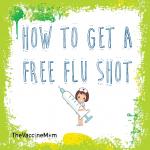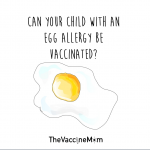Can your child with an egg allergy be vaccinated?
Does your child have an egg allergy? If so, you’re not alone because around 5 out of 100 kids with allergies have an allergy to eggs. Since some vaccines may contain egg proteins, does that mean that 5 out of 100 kids can’t be vaccinated? No, and let me tell you why. The three vaccines […]
The Seasonal Influenza Virus Vaccine
It’s flu season again. And you have a decision to make. Should you get the flu vaccine this year? Before you get started educating yourself on the influenza vaccine (and I applaud you for doing so), you may want to read the previous two articles in this flu education series: So many people are confused about what […]



